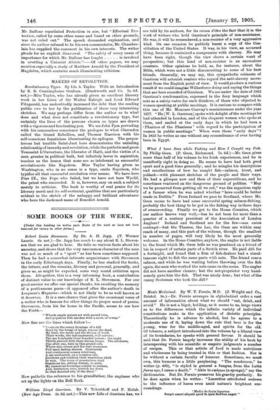William Lloyd Garrison. By V. Tchertkoff and F. Holah. {Yew
Age Press. 2s. 6d. net.)—This new Life of Garrison has, we are told by its authors, for its raison d'être the fact that it is the work of writers who hold Garrison's principle of non-resistance. Ho was, it will be remembered, a non-resister of a very aggressive kind. On one occasion he publicly burnt a copy of the Con- stitution of the United States. It was, in his view, an accursed thing, because it contained a compromise with slavery. He may have been right, though the view shows a certain want of perspective; but this kind of non-resister is an anomalous creature. Other opinions he held, as, for instance, about the Bible, which were not a little disconcerting to some of his- best friends. Generally, we may say, this sympathetic estimate of Garrison will astonish readers who regard the anti-slavery move- ment from the English point of view. It would produce a curious result if we could imagine Wilberforce doing and saying the things that are here recorded of Garrison. We see under the date of 1853 , Garrison's condemnation, expressed in the fiery language which loots as a safety-valve for such thinkers, of those who objected to women speaking at public meetings. It is curious to compare with this one of Mr. Moncure Conway's reminiscences under the year 1877. "He [W. L. Garrison] spoke with delight of the meetings he had attended in London, and of the eloquent women who spoke at them, and smiled at the early days in which he had been a Pharisee of the Pharisees' with regard to the participation of women in public meetings." When were those "early days " ? In 1853 he writes as one without any remembrance of ever having been in Egypt.






















































 Previous page
Previous page